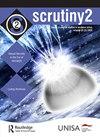Violence and Voice in Wopko Jensma’s Poetry
IF 0.1
0 LITERATURE
Scrutiny2-Issues in English Studies in Southern Africa
Pub Date : 2018-09-02
DOI:10.1080/18125441.2019.1612938
引用次数: 0
Abstract
ABSTRACT The imagery of violence, specifically to the face and head, is a recurring motif in Wopko Jensma's poetry. In this article I present a discussion of the poems in which he makes extensive use of such brutal imagery. I describe the development of his use of violence, from its figuration of an ambivalent political symbol to its signification of subjective fragmentation or loss. In doing so I focus on the function of grammatical voice, with its inherent demarcation of agency and subjectivity, as well as its relationship to the less specific meanings of voice in a literary context, in the poems. I argue for a structural connection between textual violence, the power dynamics coded into a text regarding grammatical voice, and its manifestation in the form of a poem's assumed or implied speaker.Wopko Jensma诗歌中的暴力与声音
暴力意象,尤其是脸部和头部的暴力意象,是伍普科·延斯马诗歌中反复出现的主题。在这篇文章中,我将对他大量使用这种残酷意象的诗歌进行讨论。我描述了他使用暴力的发展,从一个矛盾的政治符号的形象到主观分裂或损失的意义。在这样做的过程中,我将重点放在语法语态的功能上,它具有内在的能动性和主体性的界限,以及它与文学语境中,诗歌中语态的不太具体的意义的关系。我认为文本暴力之间存在结构上的联系,文本中关于语法声音的权力动态编码,以及它以诗歌假设或暗示的说话者的形式表现出来。
本文章由计算机程序翻译,如有差异,请以英文原文为准。
求助全文
约1分钟内获得全文
求助全文
来源期刊
CiteScore
0.50
自引率
0.00%
发文量
10
期刊介绍:
scrutiny2 is a double blind peer-reviewed journal that publishes original manuscripts on theoretical and practical concerns in English literary studies in southern Africa, particularly tertiary education. Uniquely southern African approaches to southern African concerns are sought, although manuscripts of a more general nature will be considered. The journal is aimed at an audience of specialists in English literary studies. While the dominant form of manuscripts published will be the scholarly article, the journal will also publish poetry, as well as other forms of writing such as the essay, review essay, conference report and polemical position piece. This journal is accredited with the South African Department of Higher Education and Training.

 求助内容:
求助内容: 应助结果提醒方式:
应助结果提醒方式:


